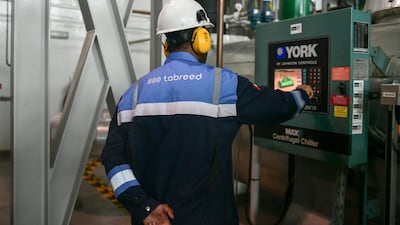The National Central Cooling Company, better known as Tabreed, reported a 168 per cent annual surge in its first-quarter net profit as revenue rose on the back of new customer connections and higher consumption.
Net profit attributable to equity holders of the parent company for the three months to the end of March climbed to Dh236.3 million ($64.34 million), compared to Dh88.2 million during the same period last year, the company said in a statement to the Dubai Financial Market, where its shares are traded.
Revenue during the period rose 10 per cent year on year to Dh464 million.
The company added 12,000 refrigerated tonnes (RT) of new customer connections during the quarter in the UAE and Oman, increasing its total connected capacity to 1.276 million RT.
“For the remainder of the year, we will continue to focus on our sustainable and strategic growth plans, which will see Tabreed grow its regional and international reach in close alignment with governments and legislators,” said Khaled Al Qubaisi, Tabreed’s chairman.
Tabreed was founded in 1998. It owns and operates 86 district cooling plants across the GCC, including 75 in the UAE, three in Saudi Arabia, seven in Oman, and one in Bahrain, in addition to other international projects and operations.
It has been rapidly expanding its operations across the region to boost its portfolio. It acquired a majority stake in Emaar Properties' Downtown Dubai district cooling business for Dh2.48 billion in 2020.
The same year, it bought two district cooling units on Saadiyat Island in Abu Dhabi from Aldar Properties in a Dh963 million deal to boost its asset base in the UAE.
In February, Saudi Tabreed entered a partnership with the Public Investment Fund as a new shareholder with a 30 per cent stake.
Last year, the company increased the foreign ownership limit of its shares to 100 per cent from 49 per cent. It is also looking at acquisition opportunities to expand in India, Asia’s third-largest economy.


